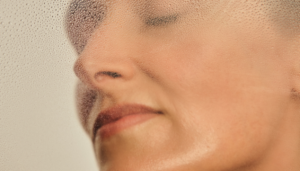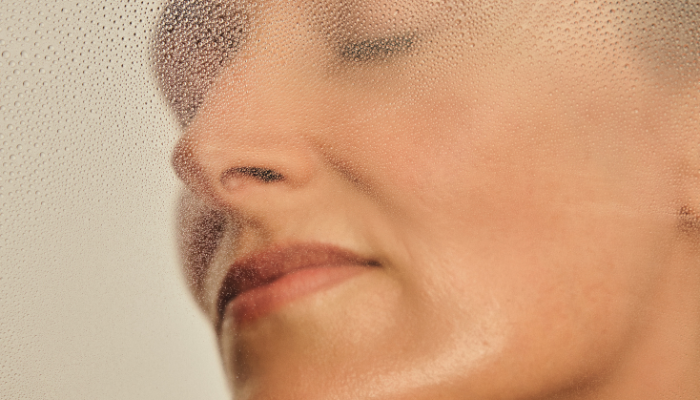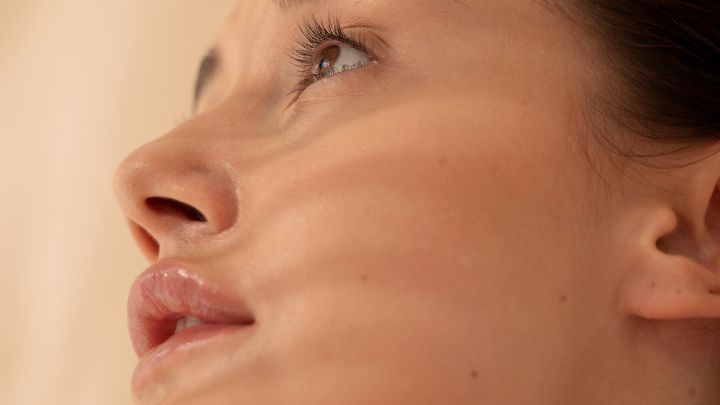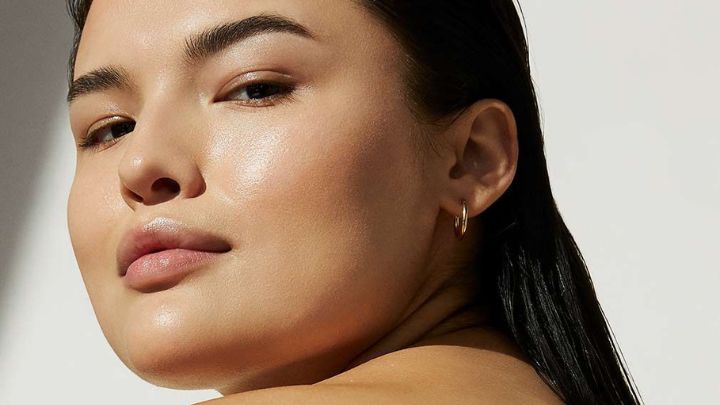Your skin is a marvellous organ, that is not just a cover for your other organs, but also a living, breathing entity all on its own. Did you know you get brand-new skin every 28 days?
The surface of your skin is constantly renewing, giving you a fresh layer almost every month. Stem cells in the lowest part of your epidermis generate new skin cells, ensuring everything stays in top shape.

As such, your skin gets to regenerate quite fast compared to other organs, healing itself when injured. This unique ability also makes it an ideal model for testing treatments and studying diseases.
But what happens when the largest and dynamic organ of your body, faces challenges like inflammation? Skin inflammation can cause discomfort, pain, and impact your skin’s ability to stay healthy and vibrant.
In this Avea article, we’ll explore how to harness your skin’s regenerative power to reduce skin inflammation and enhance its appearance.
You’ll find practical tips from Dr. Andrew Huberman’s podcast with Dr. Teo Soleymani, M.D, on how to keep your skin calm, clear, and glowing, all whilst supporting your overall longevity.
Ready to feel comfortable and confident in your own skin?
In this article
Free guide to reverse your biological age

- Master the science of rejuvenation.
- Apply proven tips to turn back the clock.
- Transform your health with top longevity specialists.
Understanding skin inflammation
What is skin inflammation?
Skin inflammation occurs when your body’s immune system reacts to a perceived threat, triggering a response that leads to symptoms like redness, swelling, heat, and itching.
This response is your body’s way of protecting itself from harm, but when it becomes excessive or chronic, it can lead to uncomfortable and persistent skin conditions.
Common causes of skin inflammation
Your lifestyle has a bigger impact on your skin’s health than you might realise. It’s not always just your genes at play.
Everyday habits, like that evening beer or unresolved stress, can quietly contribute to skin inflammation.
In fact, inflammation can be caused by a range of things, from irritants that disrupt your skin’s natural barrier to allergens that provoke an immune response, as well as infections from bacteria, viruses, fungi, or parasites, and even insect bites that introduce irritants.
These triggers can all lead to redness, itching, swelling, and other frustrating symptoms. Recognising and avoiding these culprits is essential for keeping your skin in check.
But before we delve into the potential triggers, let’s take a moment to understand the different types of inflammatory skin conditions that could be causing chaos on your skin complexion.
Types of inflammatory skin conditions
1. Vitiligo
Vitiligo is an autoimmune condition where the immune system mistakenly attacks and destroys melanocytes, the cells responsible for producing skin pigment.
This results in patches of depigmented skin, often appearing on areas like the elbows, knees, and face.
Interestingly, despite their increased sensitivity to sunburns due to the lack of pigment, those with vitiligo have a significantly lower risk of developing skin cancer.
This is because their overactive immune system is highly vigilant in detecting and destroying cells with potential mutations before they can develop into cancer.
Traditionally, treatments have focused on suppressing the immune response in the skin using topical steroids, calcineurin inhibitors, and specific wavelengths of UV light, like the 308 nm excimer laser.
Recently, advancements have introduced JAK inhibitors, a class of drugs that specifically target the pathways involved in the autoimmune response, offering more effective treatments for stubborn cases of Vitiligo.
2. Rosacea
Rosacea, often referred to as adult acne, manifests in four main types:
- Erythematotelangiectatic Rosacea (redness): Characterised by persistent redness, flushing, and visible blood vessels on the face.
- Papulopustular Rosacea (acne-like): Resembles acne, with red bumps and pustules.
- Phymatous Rosacea (thickened skin): Leads to thickened, bumpy skin, especially on the nose.
- Ocular Rosacea: Affects the eyes, causing redness and irritation.
Alcohol is a known trigger for rosacea as it acts as a vasodilator, worsening redness and flushing. Other triggers include UV light, spicy foods, hot beverages, and emotional stress.
For redness, topical creams offer temporary relief, but laser treatments are highly effective in targeting and reducing visible blood vessels.
For pimple-like rosacea, there are effective topical and oral medications that address both the bacterial and immune components of the condition.
3. Eczema
Eczema, also known as atopic dermatitis, is a common skin condition that results from three main factors:
- Genetic barrier defect: Eczema patients often have a less tightly woven skin barrier, making it easier for irritants to penetrate.
- Environmental triggers: Allergens or irritants can easily breach the skin’s defences and trigger an immune response.
- Overactive immune response: The immune system reacts more vigorously to these triggers, leading to inflammation and irritation.
Eczema is usually treated through the following approaches:
- Moisturisation: Sealing your skin barrier is crucial. Regular use of moisturisers helps prevent irritants from entering the skin.
- Avoiding triggers: Use fragrance-free and preservative-free products to minimise exposure to potential allergens.
- Topical medications: Steroids and other topical treatments can calm the immune response in the skin. In severe cases, biologic medications targeting specific immune pathways are highly effective.
4. Dandruff and Psoriasis
If you’re dealing with a dry or flaky scalp, it’s usually due to one of two conditions:
- Seborrhoeic Dermatitis (medical-grade dandruff): Caused by an overgrowth of yeast on the skin combined with excess oil production.
- Psoriasis: An autoimmune condition where the skin’s cell turnover rate accelerates, leading to the build-up of thick, scaly patches, which can affect the scalp.
Treating such inflammatory skin conditions often involves a combination of medications to reduce inflammation, itching, and swelling, alongside adjustments to skincare routines and lifestyle habits.
These changes help minimise triggers and effectively manage symptoms, promoting healthier skin.
Let’s uncover the everyday habits that could be the major causes of skin inflammation.
Major causes of skin inflammation
1. How stress impacts your skin
You can’t measure stress in a lab (yet), but you can definitely see its effects in the mirror.
Stress significantly affects your skin, both immediately and over time. This is due to the release of stress hormones.
Chronic stress, driven by cortisol, breaks down collagen and elastin, which leads to faster ageing. This is why people under constant stress, like presidents or underpaid workers, often age more rapidly.
Now, stress doesn’t just make you look tired; it can even change your entire appearance by redirecting blood flow away from your skin, making you look pale or gaunt. Over time, chronic stress will end up degrading the quality of your skin, unless addressed properly.
2. The effects of coffee on skin redness
Caffeine is a known vasoconstrictor, meaning it tightens blood vessels and capillaries in your skin. But the amount of caffeine in your morning coffee or tea only causes a minor and temporary effect.
Whilst high caffeine intake can cause brief vasoconstriction, your body usually compensates with vasodilation, so the overall impact on skin is minimal.
Interestingly, people who consume a lot of caffeine might notice oilier skin, possibly due to these vascular effects, but the data on whether caffeine is beneficial or neutral for skin is still mixed.
Now, if you have a skin condition like rosacea, you might be more sensitive to these changes, and could notice more redness or flushing with caffeine consumption.
But, it turns out that the temperature of your drinks plays a bigger role in skin redness than the caffeine itself. Hot beverages can make redness more pronounced, whilst cold ones don’t have the same effect.
3. How nicotine causes skin ageing
Nicotine is also a well-known vasoconstrictor. When smoked, nicotine’s concentration is higher in the skin due to inhalation, leading to significant vasoconstriction.
This chronic constriction accelerates skin ageing and impairs wound healing, which is why smokers tend to age faster and have poorer surgical outcomes.
Regular nicotine use, especially daily or multiple times a day, adds up and negatively impacts skin health. Even vaping causes similar skin issues.
Whether it’s due to inhalation or nicotine concentration, vaping leads to the same vasoconstriction seen with smoking. The effects on the skin are comparable when nicotine levels match.
Nicotine in gum, mints, or patches is less problematic for the skin. The nicotine has to be processed through your digestive system or bloodstream before it reaches your skin, which lowers its concentration and reduces the vasoconstrictive effects.
It’s best to avoid nicotine altogether, as it does more than just accelerate skin ageing.
4. Alcohol’s impact on skin health
Here’s our favourite; alcohol’s impact on your skin is only negative, both immediately and over time.
Short-term
When you drink, alcohol dehydrates your skin, leaving it dry and dull. You might wake up with bags under your eyes or that classic “hungover” look. If you can’t metabolise alcohol efficiently, as some do, you’ll see an even more pronounced redness or flush due to the build-up of toxins.
Long-term
Regular drinking causes chronic dehydration, leading to increased oiliness, breakouts, and congested skin. It also tends to accompany poor skincare habits—after a night out, most people skip their skincare routine, which accelerates ageing and damages skin health.
Gut impact
Alcohol disrupts your gut microbiome, and that damage shows up on your skin. High-alcohol drinks can paralyse gut function, leading to digestive issues that negatively affect skin appearance.
Our advice on alcohol: limit it or cut it out entirely. Your cells will thank you.
Does the sun cause inflammation?
1. The importance of sun exposure
Now, the sun and its relationship with ageing have been known for ages, but it’s a bit of a balancing act.
Whilst too much UV exposure can lead to skin cancer and speed up the ageing process, sun is still crucial for staying alive. Here are a few things to keep in mind:
1. Sun exposure and Vitamin D
You don’t need to spend hours baking in the sun to get your Vitamin D fix. Just 15–20 minutes of sun, daily, is enough to keep your levels in check.
2. Mood and well-being
Catching some rays, especially in the morning, helps set your body’s internal clock, improving your mood, focus, and sleep. There’s something about sunlight that just makes you feel good—spend a winter in Berlin, and you’ll see what we mean.
3. Individual tolerance
Not everyone’s skin reacts to the sun the same way. If you’re fair-skinned, you might burn easily and need to be more cautious. Those with darker skin can often tolerate longer exposure without burning. The goal? Enjoy the sun, but don’t overdo it—red skin is your body’s way of saying “enough.”
2. Protecting your skin from sun damage
Whilst sun exposure is important, the sun also accounts for 90% of skin ageing. UV protection can really make a difference in slowing down the ageing process.
Just look at that famous photo of the truck driver, whose face aged unevenly due to sun exposure. Source: (New England Journal of Medicine)The jarring effects of UV radiation.
When it comes to protecting your skin from sun damage, nothing beats physical barriers like clothing and shade. These options are often more effective and reliable than any cream or lotion you might apply.
1. Physical barriers
Covering up with hats, long sleeves, and seeking shade provides consistent protection that doesn’t wear off, unlike sunscreen, which needs reapplication. It’s your best bet for all-day coverage, especially during peak sun hours.
2. Sunscreens
Whilst sunscreen is a go-to for many, it’s not the only line of defence. Sunscreens are regulated as over-the-counter drugs, but they aren’t foolproof. Despite their benefits, particularly in reducing the risk of melanoma and squamous cell carcinoma, they don’t offer complete protection against all types of skin cancer, such as basal cell carcinoma.
3. Oral supplements
Some people are turning to oral supplements for additional protection. These supplements can extend the time you can safely spend in the sun, especially when reapplying sunscreen isn’t practical. However, they should be used as a complement to, not a replacement for, physical protection and sunscreen.
3. What are the different types of sunscreen?
To prevent premature skin ageing, consider wearing your SPF daily. And let’s also clear up some confusion: “sunblock” used to refer to products that physically block UV rays, whilst “sunscreen” absorbed them.
Nowadays, the FDA just calls it all “sunscreen” to keep things simple. So, how do you buy the best sunscreen out there?
1. Mineral-based sunscreens
Mineral-based sunscreens include options with zinc oxide or titanium dioxide. They act like a shield, reflecting and absorbing UV rays without any chemical reaction. Think of them as the safe bet for broad-spectrum protection.
2. Chemical (organic) sunscreens
Chemical sunscreens work by absorbing UV rays and turning them into heat. They’re effective, but they do involve a chemical process within your skin.
Here’s the thing about chemical sunscreens, particularly those with ingredients like oxybenzone. They have been found in the bloodstream at unexpectedly high levels. And that’s no good sign.
A 2020 study revealed these ingredients exceeded FDA safety limits, prompting concerns about their potential to disrupt hormones or affect the nervous system.
Whilst definitive harm in humans isn’t proven, the evidence has led many experts to recommend safer, mineral-based sunscreens over chemical ones.
How to choose the best sunscreen?
Avea’s take? Mineral-based sunscreens are the way to go! They’ve been around for years, and you don’t have to worry about what’s getting absorbed into your skin.
When picking a mineral-based sunscreen, keep a few things in mind:
- Broad-spectrum protection: Ensure the sunscreen offers protection against both UVA and UVB rays, as both can contribute to skin cancer and premature ageing.
- SPF level: Look for an SPF of 30 or higher to ensure adequate protection, even if you apply less than the recommended amount.
- Texture: Higher concentrations of zinc oxide or titanium dioxide offer better protection, but may feel thicker on the skin. Find a balance between effective protection and a texture you’re comfortable with for regular use.
- Usability: The best sunscreen is the one you’ll actually wear, so choose a product that feels good on your skin, smells pleasant, and fits seamlessly into your daily routine.
Learn how to repair sun-damaged skin.
How to reduce skin inflammation?
Skin inflammation can stem from various factors, but how do you reduce it? We’ve got proven, science-backed tips to help you achieve a calmer, healthier complexion.
1. Your skin is a reflection of what you eat
Research has shown that the gut microbiome significantly impacts inflammatory skin conditions like psoriasis, eczema, and acne.
By controlling gut dysregulation with an anti-inflammatory, longevity diet, and probiotics and prebiotics, you can decrease the severity and intensity of these conditions in measurable ways.
Note that some people’s gut microbiomes are highly responsive to dietary changes, whilst others remain stable regardless of their diet.
This makes it challenging to pinpoint a one-size-fits-all approach. Focusing on a high-protein, anti-inflammatory diet that includes animal-based proteins, fruits, and vegetables is generally beneficial for skin health, – Dr. Teo Soleymani.
Discover the top 9 anti-ageing foods for your skin.
2. Benefits of collagen supplementation on the skin
Collagen supplementation can have a noticeable impact on skin hydration and elasticity.
By increasing blood osmolality, collagen supplements help draw more water into blood vessels, temporarily plumping your skin for a more youthful appearance.
Collagen also stimulates fibroblasts—the cells responsible for producing collagen fibres—leading to a thicker dermis and improved water-binding capacity.
Besides, collagen peptides enhance the skin’s barrier function, reducing transepidermal water loss (TEWL) and maintaining hydration. Their antioxidant effect helps neutralise free radicals, preventing skin damage and dehydration.
In short, collagen supplements can help boost your skin appearance.
Avea’s solution: 100% vegan Collagen Activator
As collagen accounts for up to 30% of the total protein in your body and 80% of your skin, its natural decline with age can lead to saggy skin, fine lines, wrinkles, and increased inflammation.
By maintaining healthy collagen levels, you can strengthen your skin’s barrier, reduce inflammation, and promote a more youthful, resilient complexion.
Discover Avea’s fully vegan patent-pending formula developed with scientists from ETH Zurich. It has been shown to activate collagen synthesis 4x more efficiently than regular collagen.
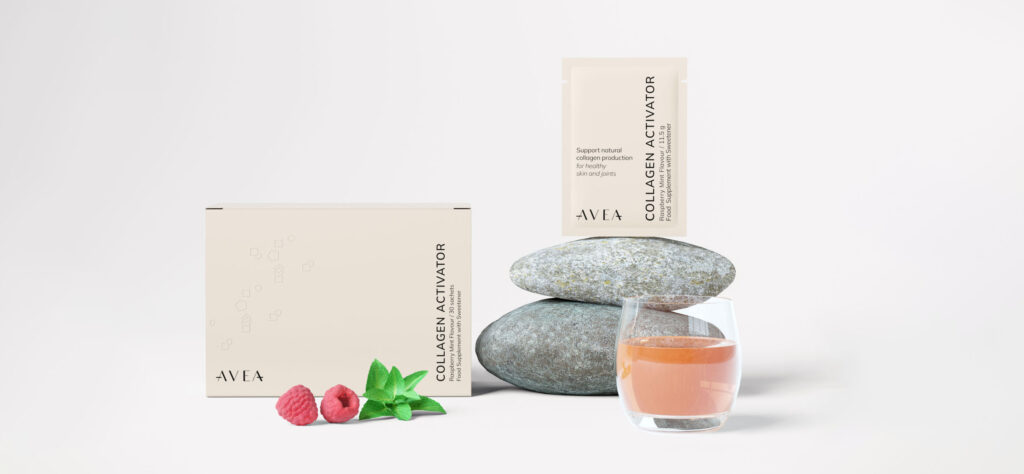
The Avea Collagen Activator was tested in a human trial with 58 participants at Hautwerk Clinic in Zurich. After one month, skin texture improved by 18% and hydration levels increased by 91%. In 90 days, skin elasticity improved by 6%.
Using Visia, Corneometer, and Cutometer analyses, we validated the efficacy of our ingredients and their dosage. Our evidence-based approach, tested by leading dermatology experts, reaffirms our commitment to advanced longevity solution
3. Benefits of Omega-3 fatty acids supplementation
Omega-3 fatty acids are known for their anti-inflammatory properties, which can benefit skin health by reducing inflammation and improving the overall condition of the skin.
These essential fats help strengthen your skin’s barrier, keeping it hydrated and protected from daily irritants. Plus, they can calm conditions like eczema, psoriasis, and acne by reducing redness and swelling.
Adding Omega-3 supplements to your routine doesn’t just boost your skin health—it supports your overall well-being, from heart health to brain function.
If you’re after glowing skin and a balanced body, Omega-3s are a must.
4. Retinoids vs. Retinol benefits
Retinoids are a powerful tool in skincare, particularly for their role in speeding up skin turnover and boosting collagen production.
Originally used to treat acne, retinoids are now recognised for their broader benefits, including reducing fine lines, wrinkles, and even the risk of skin cancer.
Retinol, often found in over-the-counter products, is a less potent form of retinoic acid that requires conversion in the skin to become active.
Prescription retinoids, on the other hand, are already active and much more potent, making them more effective in enhancing skin health and reducing the signs of ageing.
5. Skin cleansing
When it comes to skin cleansing, simple is often best. Unscented, gentle soaps like Dove or Cetaphil are excellent choices, especially if you have sensitive skin.
Avoid over-cleansing, as it can strip your skin of its natural oils and disrupt your skin’s microbiome, leading to dryness, irritation, and breakouts.
The frequency at which you have to cleanse depends on your skin type and lifestyle. Oily or acne-prone skin may require cleansing once or twice a day, whilst dry or sensitive skin benefits from less frequent cleansing.
6. Choosing the best moisturiser
When choosing a moisturiser, consider the following tips:
- Non-comedogenic: Ensure the product is labeled non-comedogenic, meaning it won’t clog your pores.
- Know your skin type: Choose between ointments, creams, and lotions based on your skin type. Ointments are greasiest and best for dry skin, creams suit most skin types, and lotions are ideal for oily or acne-prone skin.
- Consider the packaging: Products in jars are thicker and more occlusive, whilst pump bottles contain lighter formulations.
Boost your collagen levels naturally
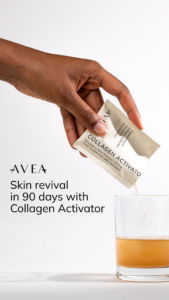
- Clinically proven results in 1 month
- 100% vegan precursor
- 4x more effective than standard collagen
- Backed by 1000+ studies
7. Laser resurfacing, exfoliation, and microdermabrasion
With advances in technology, skin enhancement has become more effective and accessible than ever.
Laser resurfacing is a highly effective method for both aesthetic and therapeutic skin enhancement.
By using focused light energy, these treatments can target and remove damaged cells, promoting healthier skin and reducing the risk of issues like skin cancer.
- Ablative lasers: These work by removing the top layer of skin, stimulating the growth of new, healthy skin underneath. Whilst offering significant results, they require a recovery period of about two weeks as the skin heals and regenerates.
- Non-ablative lasers: These penetrate deeper layers of the skin without damaging the surface, encouraging collagen production and skin renewal with minimal downtime. Such treatments are particularly beneficial for reducing the risk of skin cancer by eliminating mutated cells.
- Exfoliation and microdermabrasion: These methods focus on the outermost layer of the skin, mechanically removing dead skin cells to improve surface texture and brightness. They only offer superficial benefits compared to the deeper, more comprehensive renewal provided by laser treatments.
Managing acne
Waking up to find acne can instantly set a negative tone for your day. Acne isn’t just a teenage problem; it affects adults too.
Hormonal changes, stress, diet, and even the wrong skincare products can contribute to breakouts. Knowing the root cause is key to finding the right solution.
1. Acne triggers
Acne is largely driven by excess sebum production, bacterial growth, and an overactive immune response. Foods with a high glycaemic index (like sugary, processed snacks) and certain dairy products (especially skim and non-fat) can make acne worse by increasing inflammation and oil production.
Discover the effects of sugar on your skin.
2. Preventing Acne
To keep acne in check, focus on cutting out these dietary triggers and using skincare products that target sebum, bacteria, and inflammation. Retinoids, whether applied topically or taken orally, can also be highly effective in managing breakouts.
3. Why you should avoid popping pimples
As tempting as it might be, popping pimples can actually cause more harm than good. When you pop a pimple, you risk triggering enzymes called Matrix Metalloproteinases (MMPs), which break down collagen and elastin, leading to scarring.
If you must pop a pimple
Only consider popping if there’s a clear white tip and minimal redness. Instead of squeezing, try using a warm compress to gently encourage the pimple to drain naturally, which reduces the risk of damaging your skin.
Post-popping care
If a pimple pops on its own, clean the area with a gentle cleanser. Avoid harsh treatments like hydrogen peroxide or over-the-counter antibiotics, as these can irritate the skin and prevent proper healing.
4. Corticosteroids for redness
In urgent situations, such as before a big event, a small amount of corticosteroid cream can help reduce redness and swelling. But be cautious—long-term use can thin the skin and even cause rebound acne. Injectable steroids should only be administered by a dermatologist, as improper use can lead to permanent skin depressions.
Ibrahim reverses bioage by 6.5 years with Avea

- Uncover how Ibrahim turned back the clock.
- Learn the secrets of cellular health.
- Start your own age-defying routine today.
Keynote from Avea
You don’t need to spend a fortune for effective skincare. Some of the best products are simple and affordable—like unscented Dove soap, Cetaphil, or Aquaphor.
Focus on using simple, effective products, protect your skin from the sun, and nourish it from the inside with a balanced diet and the right supplements. This approach will help your skin stay vibrant and resilient for years to come.
If skin inflammation continues to be an issue, it’s wise to consult a dermatologist or healthcare provider. They can help you find the right treatment plan, tailored to the specific causes of your symptoms.







